“Your child has cancer.”
Those may be the most frightening words a parent will ever hear. But for too many parents, it’s a painful reality.
One family heard those words about their son, Koby, an amazing bright light who loved singing, playing the drums, and making people laugh. In 2016, when he was 11 years old, he was diagnosed with a deadly brain tumor. His mom, Melanie, shared their journey with us.
Dear Koby,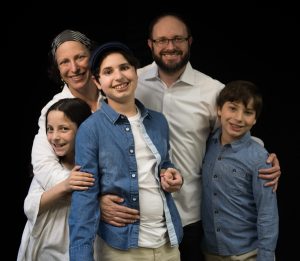
Two and a half years ago you complained of a headache. At first, we thought it was just a headache. When the pain became increasingly worse, your dad and I took you to the emergency room at Children’s Hospital Colorado. We were worried, of course, but completely unprepared for what was to happen next. Doctors performed tests and then discovered you had a brain tumor.
We almost lost you at the start of that journey. Within days, we knew that glioblastoma would eventually steal you from us.
Koby’s story – and the experience of his mother, father, and younger twin siblings – is devastating. And it’s all too common.
Childhood cancer is still the leading cause of death by disease for our kids. Every day, 43 kids are diagnosed – that’s more than 15,000 NEW childhood cancer diagnoses every year.
During six weeks inpatient at Children’s Colorado, you re-learned basic living skills such as breathing, swallowing, eating, speaking, and walking. You endured three radiation series, chemotherapy, many transfusions, and numerous clinical trials. As much as you hated having your port accessed, you would sing to the oncology nurses while they tended to you. You went through hours of speech, occupational, and physical therapy.
After so many appointments, you felt like the “Mayor” of Children’s Colorado, swaggering through the lobby, greeting everyone you saw. You created “Koby’s Karaoke (almost) Hour” at Seacrest Studios to make your hospital visits (and other kids’ days) more bearable. You had the opportunity to take a Make-A-Wish Trip to Hawaii and spent two weeks at Roundup River Ranch. You finished fifth grade, and you made it through sixth.
You fought so hard.
More than 40,000 kids are actively undergoing treatment for cancer, and 1 out of every 8 of them won’t survive. Among those who do, more than 60% will suffer devastating late effects such as secondary cancers, muscular difficulties, and infertility.
Those are the stats. But YOU can change them. Your pledge makes the difference. Join us today by pledging $250 or more to The Morgan Adams Foundation and together we can help give kids with cancer a real chance.
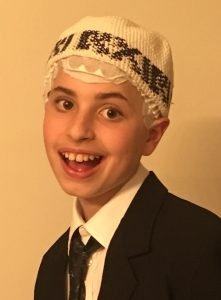 In February 2017, we found out your tumor had grown. The doctors warned us you might not make it until the summer. We enlisted with Denver Hospice and prepared for the worst. We held an impromptu bar mitzvah celebration six months earlier than scheduled, but you always reminded us your real bar mitzvah would be in December.
In February 2017, we found out your tumor had grown. The doctors warned us you might not make it until the summer. We enlisted with Denver Hospice and prepared for the worst. We held an impromptu bar mitzvah celebration six months earlier than scheduled, but you always reminded us your real bar mitzvah would be in December.
The first day of seventh grade, in August 2017, an MRI showed your tumor had grown. Finally, you said it just wasn’t worth it, and together, we opted to discontinue treatment. In October, Dr. Dorris, your oncologist, urged us to plan for December 2, your “real” bar mitzvah.
You didn’t only “get through” your bar mitzvah; you were there in all of your glory. Almost a thousand community members, family, and friends embraced you that day, and saw your incredible light shine at our synagogue. You sang, you spoke, you wowed the crowd — and the love we felt that day was incredible.
HOW powerful is your gift? At times, the science, the research behind new treatments seems hard to comprehend. Often, it feels like it’s moving too slowly. And we know that the idea of “cancer research” can sometimes seem like a big black hole.
But there are kids and young adults who are alive today because of your support. Because of the investment you have made. And because you have continued to be a very real part of the research that has shown doctors which treatments can be effective and successful in treating our kids.
How do we know? Here’s how:
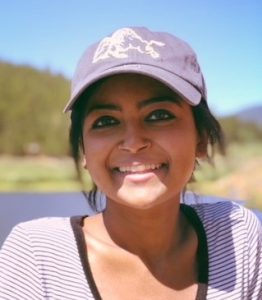 In 2010, when Kuhu was 13, she went to the doctor after noticing numbness in her right hand that made it difficult for her to write, eat, and play the clarinet. An MRI revealed a small mass on her brain stem.
In 2010, when Kuhu was 13, she went to the doctor after noticing numbness in her right hand that made it difficult for her to write, eat, and play the clarinet. An MRI revealed a small mass on her brain stem.
Kuhu had surgery immediately to remove as much of the tumor as possible. A biopsy revealed it was a brainstem ganglioglioma. After careful consideration and research, Kuhu and her family opted for a treatment protocol of proton radiotherapy for six weeks. But a year later, another MRI scan revealed that the tumor had grown.
Dr. Foreman at Children’s Hospital Colorado dug deeper. He found that Kuhu’s tumor had a BRAF v600e mutation — a mutation that was being treated successfully in adult melanomas with a drug called vemurafenib.
With funding from The Morgan Adams Foundation and compassionate-use aid from the drug manufacturer, Dr. Foreman started Kuhu on a combination chemotherapy cocktail of vemurafenib and vinblastine.
Follow-up MRIs starting six weeks later revealed that the tumor was shrinking! In the following weeks, Kuhu’s symptoms resolved.
Kuhu is the first pediatric brain tumor patient to be successfully treated with vemurafenib, and one of the first cases of successful “targeted therapy” in pediatric neuro-oncology.
Where did it go from there?
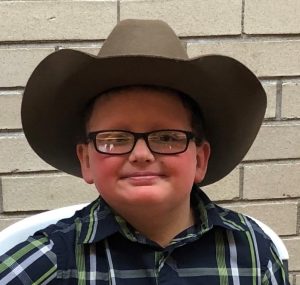 Caden’s doctor at Minnesota Children’s Hospital was at a loss after treatment for bilateral optic glioma ultimately left Caden blind – and then he relapsed. After reading the v600e case study published by Dr. Foreman’s lab, Caden’s doctor contacted Children’s Colorado for more information. Caden started the vemurafenib protocol in 2013 and had clear scans a year later. Today, Caden, though still visually impaired, is thriving in so many ways; he plays the piano, guitar, and clarinet, and just recently won first place at a national art show.
Caden’s doctor at Minnesota Children’s Hospital was at a loss after treatment for bilateral optic glioma ultimately left Caden blind – and then he relapsed. After reading the v600e case study published by Dr. Foreman’s lab, Caden’s doctor contacted Children’s Colorado for more information. Caden started the vemurafenib protocol in 2013 and had clear scans a year later. Today, Caden, though still visually impaired, is thriving in so many ways; he plays the piano, guitar, and clarinet, and just recently won first place at a national art show.
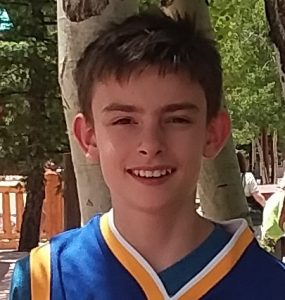 In late 2012, Cash was diagnosed with a ganglioglioma that was removed surgically, but six months later Cash relapsed and the cancer spread to his spine. Cash’s tumor was analyzed and found to have the BRAF mutation. He was put on the vemurafenib protocol and finished the chemotherapy regimen in 2014. Cash was the second patient in Colorado to take part in the vemurafenib trial. Nearly five years out of treatment, Cash is cancer-free, in middle school, and enjoys playing basketball, Fortnite, and other video games.
In late 2012, Cash was diagnosed with a ganglioglioma that was removed surgically, but six months later Cash relapsed and the cancer spread to his spine. Cash’s tumor was analyzed and found to have the BRAF mutation. He was put on the vemurafenib protocol and finished the chemotherapy regimen in 2014. Cash was the second patient in Colorado to take part in the vemurafenib trial. Nearly five years out of treatment, Cash is cancer-free, in middle school, and enjoys playing basketball, Fortnite, and other video games.
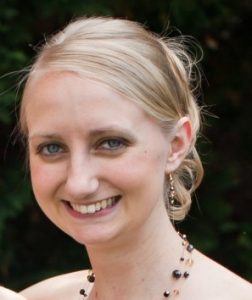 Those who are no longer with us have helped others move toward answers. In late 2011, Lisa was diagnosed with a high-grade glioblastoma multiforme / pleomorphic xanthoastrocytoma with anaplastic features, a tumor as complex as its name, at age 21. She was an incredibly brave and determined person, dedicated to pursuing research and new treatment options for all kids with brain tumors. She IS the reason we know more about overcoming drug resistance in BRAF mutated tumors. Lisa passed away in May 2017, but we are forever grateful to her for her selflessness and willingness to push new treatments forward, always with the hope of helping other kids and teens battling cancer.
Those who are no longer with us have helped others move toward answers. In late 2011, Lisa was diagnosed with a high-grade glioblastoma multiforme / pleomorphic xanthoastrocytoma with anaplastic features, a tumor as complex as its name, at age 21. She was an incredibly brave and determined person, dedicated to pursuing research and new treatment options for all kids with brain tumors. She IS the reason we know more about overcoming drug resistance in BRAF mutated tumors. Lisa passed away in May 2017, but we are forever grateful to her for her selflessness and willingness to push new treatments forward, always with the hope of helping other kids and teens battling cancer.
And now?
Over the last four years, we have seen incredible progress for BRAF tumors. We now have targeted therapies for BRAF fusion, and separate targeted therapies for BRAF v600e mutations. In Colorado alone, more than 25 kids have been successfully treated on this protocol.
Today, Kuhu is healthy and thriving. She is a senior at the University of Colorado Boulder and will graduate in the spring. She plans to pursue a master’s degree in clinical mental health.
Kuhu is proud to have been part of the research conducted with vemurafenib because, she says, “I feel good that as I’m getting cured, I’m impacting the future children with similar conditions. I know that in the end, we’ll have learned a lot from the experience and the research of this drug will be available all over the world. It will change lives.”
You can make the difference.
Your investments in The Morgan Adams Foundation have supported the work that has gone into understanding the genetic basis for many pediatric brain tumors, including low-grade tumors like gangliogliomas, which historically have been very difficult to treat. This research resulted in the identification of a specific treatable genetic mutation which, in Kuhu’s case, after radiation failed, delivered dramatic improvements in her symptoms and ultimately, saved her life.
Seven weeks after your bar mitzvah, Koby, you passed away at home, surrounded by loved ones. Your physical time here on earth came to an end on January 19, 2018, but your bright light will endure forever.
There’s something I have come to call the “ripples of Koby” — when friends and family from all over tell me of a moment that made them feel connected to you. These beautiful moments and stories bring all of us comfort.
At the same time, this should not have happened. No parent should receive the words that we heard — that our son had an incurable tumor. We’ve lost so many friends along the way: Trevor, Cooper, Chase, Piper, and Kate…. And we see so many kids surviving, and suffering from the side effects of the tumors and the treatments they received. This is a lifelong journey for all of us, including the survivors who walk this path.
We are grateful to The Morgan Adams Foundation for the community they build, the awareness they raise, and the research they fund. Hopefully, in the future, our kids will have better outcomes. Our kids and families deserve more.
Love,
Mommy, Abba, Hannah, and Micah

There are kids who will survive and have a better life because of your support today.
Your gift to The Morgan Adams Foundation will help us give doctors the tools and treatments they need so that no parent facing a child’s cancer diagnosis will hear the words, “We’re sorry, but there is nothing we can do.”
Your support of our mission enables us to help our doctors develop targeted treatment therapies that will ultimately be more effective — and, we hope, will one day prevent kids from having to deal with chemotherapy, radiation, and the side effects of cancer.
Simply put, YOUR gift will help change the lives of kids with cancer. Research is the only way to move forward, to a world where every kid is cancer-free.
Sincerely,

Joan Slaughter
Founder and Executive Director

